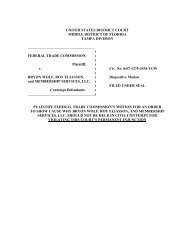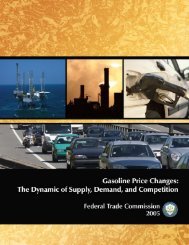HELO RCPT TO QUIT MAIL FROM DATA - Federal Trade Commission
HELO RCPT TO QUIT MAIL FROM DATA - Federal Trade Commission
HELO RCPT TO QUIT MAIL FROM DATA - Federal Trade Commission
Create successful ePaper yourself
Turn your PDF publications into a flip-book with our unique Google optimized e-Paper software.
Subject Line Labeling As a Weapon Against Spam<br />
are not aware of any studies that have examined the effectiveness of this new<br />
requirement. 36<br />
III. The <strong>Commission</strong> Recommends Against Mandatory<br />
Subject Line Labeling<br />
A statutory requirement that UCE bear a subject line label would sweep<br />
broadly. In the floor discussion preceding passage of the CAN-SPAM Act,<br />
Senator McCain contended that unsolicited email may be welcomed by some but<br />
condemned by others, making the task of email regulation a difficult one:<br />
[T]he word ‘spam’ means different things to different people. The<br />
<strong>Federal</strong> <strong>Trade</strong> <strong>Commission</strong> defines spam generally as ‘unsolicited<br />
commercial email’ and some Americans do not want any of it. Other<br />
consumers like to receive unsolicited offers by email; to these<br />
consumers, spam means only the unwanted fraudulent or pornographic<br />
email that also floods their inbox.<br />
Many American businesses view email over the Internet as a new<br />
medium through which to market or communicate more effectively<br />
with customers. To them, this type of communication is not spam, but<br />
commercial speech protected by the First Amendment. The Direct<br />
Marketing Association reports that 37 percent of consumers it surveyed<br />
have bought something as a result of receiving unsolicited email from<br />
marketers.<br />
Internet service providers are the businesses caught in the middle, forced<br />
every day to draw distinctions between what they perceive as legitimate<br />
email and what is spam. In this environment, the risk of ISPs blocking<br />
legitimate mail that consumers depend on, such as purchase receipts<br />
or healthcare communications, is as much a concern as the prospect<br />
of failing to block as much spam as possible in the face of consumer<br />
demand. 37<br />
36. KISA: Chung – Spam Forum (May 2, 2003), 111-12. The Spam Forum was a three-day workshop<br />
held by the FTC in the spring of 2003. The <strong>Commission</strong> posted these transcripts online at http://www.ftc.<br />
gov/bcp/workshops/spam. Citations to the transcripts of the Spam Forum identify the speaker’s organization<br />
and name, the date of the Forum, and the page number on which the statement can be found. For instance,<br />
the citation “KISA: Chung – Spam Forum (May 2, 2003), 167” would refer to a statement made by KISA<br />
employee Hyu-Bong Chung that can be found on page 167 of the May 2, 2003 Spam Forum transcript.<br />
37. 108 th Congress, Cong. Rec. S13020 (daily ed. Oct. 22, 2003) (statement of Sen. McCain), available<br />
at http://thomas.loc.gov. In a 2003 study of online behaviors, 92 percent of email users believed that spam is<br />
UCE from a sender they do not know or cannot identify. Pew Internet and American Life, Spam: How it is<br />
Hurting Email and Degrading Life on the Internet, Oct. 22, 2003, 10, available at http://www.pewinternet.<br />
org/reports/pdfs/PIP_Spam_Report.pdf.<br />
9

















